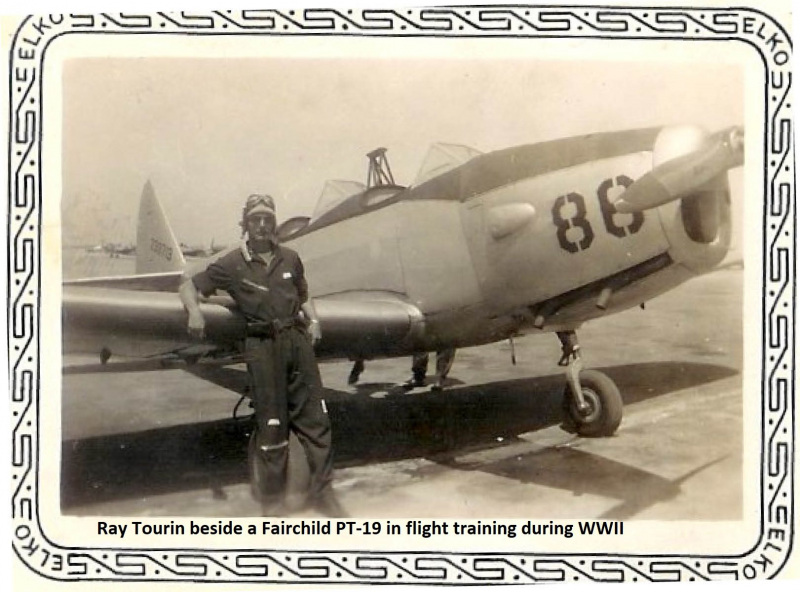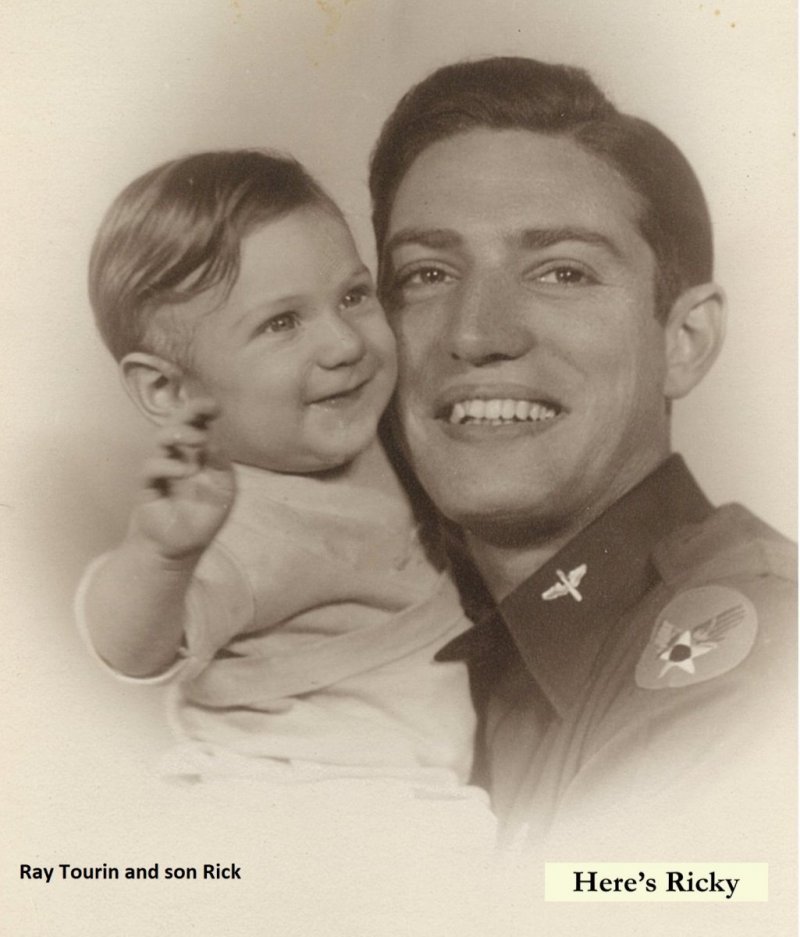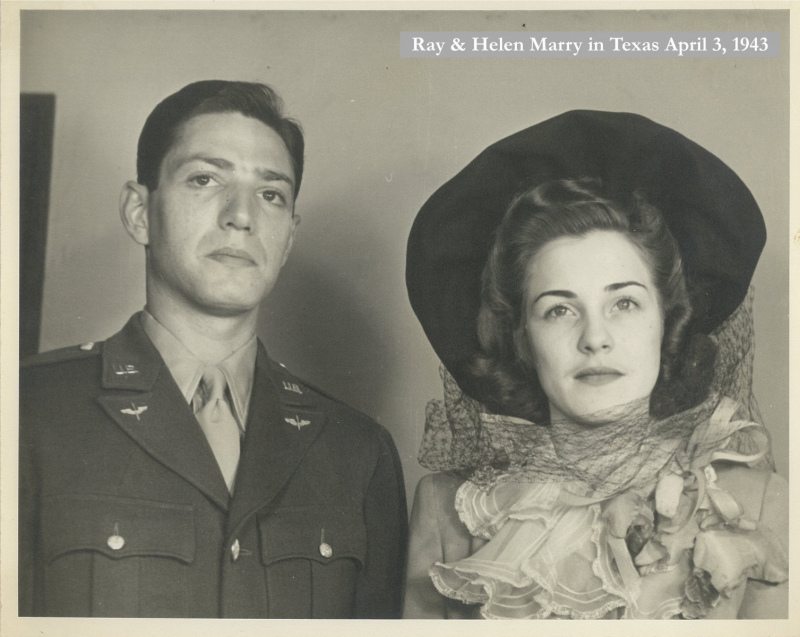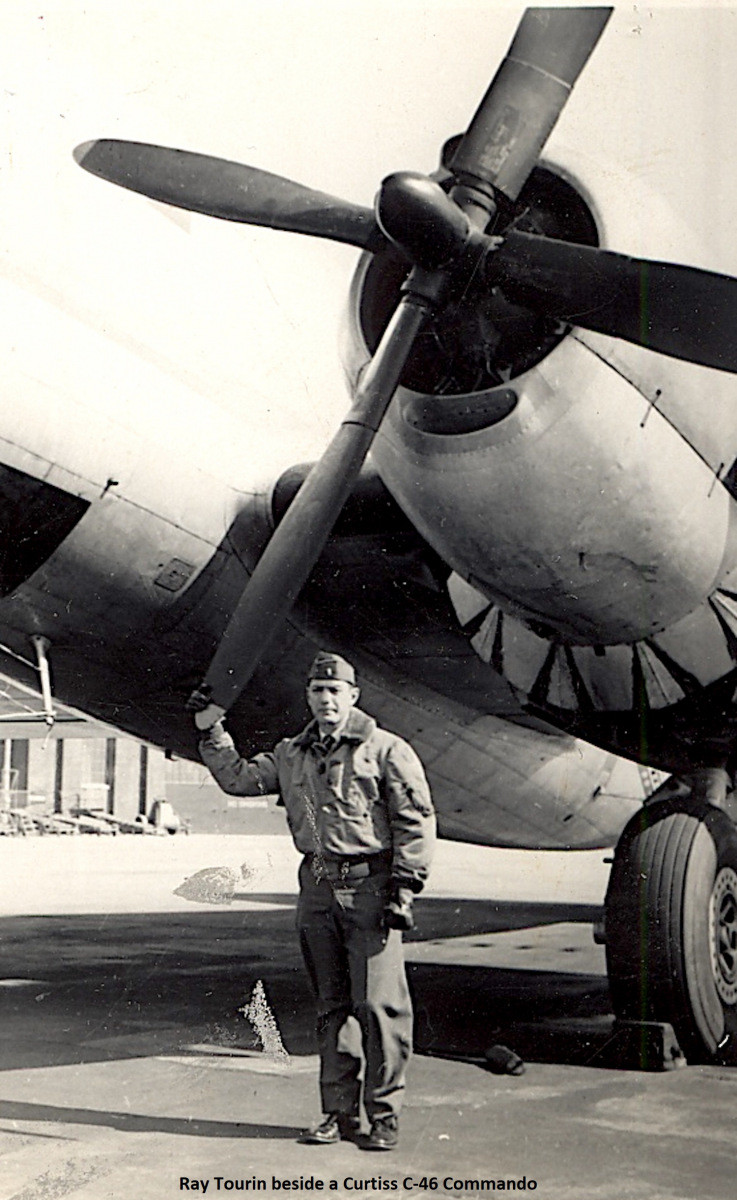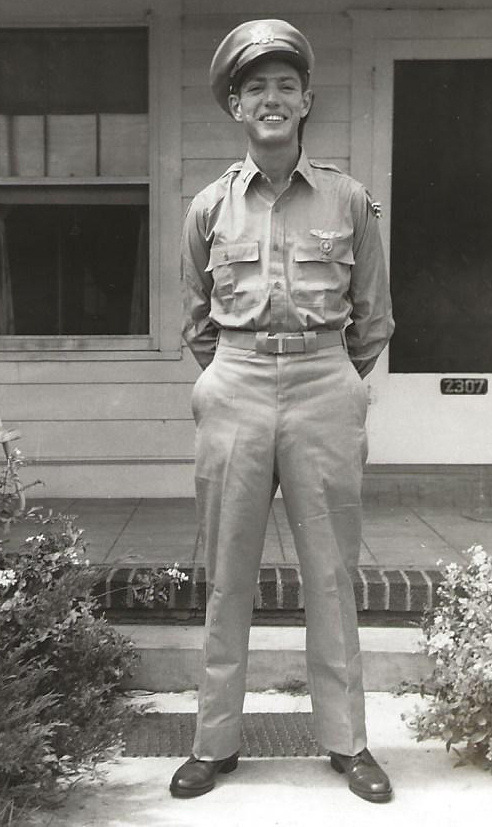Raphael “Ray” Tourin
“An interview with pilot Raphael ‘Ray’ Tourin, “A Story that Inspires,” provided by his family”
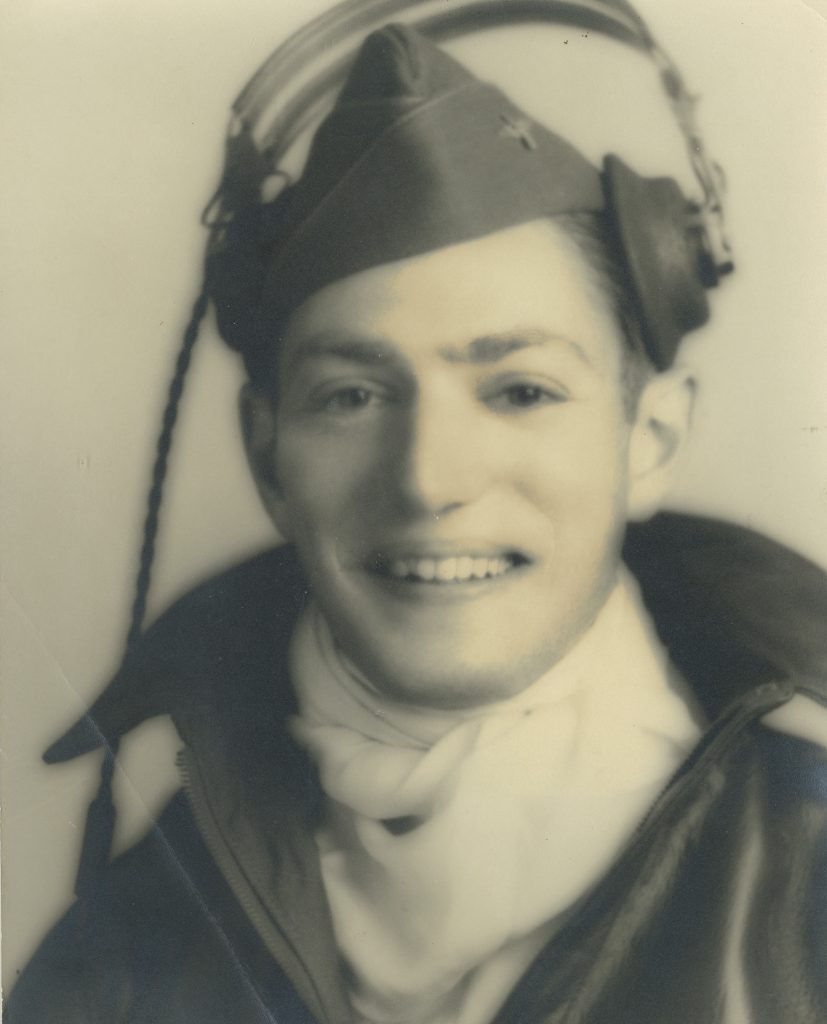
The following was transcribed from a 2009 video interview with Ray Tourin
“My name is Ray Tourin and I’ve reached the ripe old age of 90.”
Narrator: “You’ve got quite a history behind you.”
“Yes I do. I have 90 years of history. A lot of it is military and then a career spent in aviation.”
Narrator: “How do you stay in shape; keep yourself mentally and physically alert. I mean, you’re in great shape for your age. Tell us-is there a secret.”
“I wish I knew the secret! I will tell you a little story. About last May I had a colonoscopy. I checked into the little hospital where they do this, and a nurse took down various data from me. A little while later she came back in and she said, “We just want to check on your birthdate. You put down that your birthdate is 1920 and we want to make sure that’s correct.” I said that’s correct, 1920. A little while later a man in a white coat, the anesthetist, came in and said (humorously), “We’re not going ahead with this procedure until you tell us the secret!” I said, I don’t know the answer to that secret. If I did, I would tell everyone what the secret is!
“I eat a pretty comfortable diet because Valerie, my wife, keeps it that way. I eat a lot of fruit. I drink a lot of wine, probably a little too much sometimes! I walk, I play golf, I work out a little in the gym to try and stay in shape and keep my strength and flexibility up. I really can’t give you a straight answer as to how I arrived at this point, looking the way I do. It just happened.”
Narrator: “Well, you’re doing a great job and congratulations. Ray, let’s talk a little about your background. You have a very interesting background, starting back in WWII. Tell us a little about what you did during the war and then what you segued into after that for a very large company.”
“I decided early in the game when the war was evident and it finally came about with Japan, that I was going to be an active participant. My dad was not happy about that. He wanted me to stay in school, but I made a decision that I was going to go. The chance came up as to which branch to enlist in. I had, at an airplane base at the Hudson River in Yonkers, taken a few hours of flying time just to see if I liked it, which I did. So I enlisted in what was then the Army Air Corps. The Air Force, as it is known today, wasn’t in existence. I guess I waited for about a year for them to finally call me up, and I left for San Antonio in December of 1942. I was just 22 years old.
Narrator: “So the war was just kind of starting then, wasn’t it?”
“Well, it started a little earlier with Japan and then we got involved in the war in Europe at that time. But I went in in December of 1942, and I was there two weeks when I was awakened by a sergeant one night. He said, “You’re going home on leave.” I said, well that’s generous of you but I’ve only been here two weeks. He said, “I can’t give you an answer why. All is known is you’re going home.” Well, what happened is that on Christmas Eve of ’42, my dad had a heart attack and died. So, I did get that one week leave to go home and take care of things at home. Then I was able to go back and join the same group that I came down with. I was afraid that I might be put back a class, but I stayed with it.
“We started out in Texas training bases. Primary was in Brady, TX; Basic Training was in Waco, TX; Advanced Training in several different bases in Texas. We actually had Advanced Training here in Florida, in St. Petersburg. I believe it’s probably the St. Petersburg-Clearwater Airport now that we were training. The fighters at that time were P-40s.”
Narrator: “So that’s what you flew in, the P40?”
“That’s what I flew when I went over to Europe for the first mission-a P-40. Then they were replaced by P-47s, which is the airplane I flew until I finally came back home.”
Narrator: “What was your mission during the war?”
“These airplanes were short-range. They did not have the length to do bomber escort like the P-51s. We were doing close-support, behind the bomb line as it kept moving. We would get a call from somebody up, pinned down by machine guns in the hills, or maybe it was they wanted a bridge taken out, or a railroad yard taken out. That was the type of mission we did, sometimes two a day. They were short. We would take off, cross over our own lines into the enemy territory, and complete whatever that mission was and return. It would only be a 2 ½ hour mission. Only once did we see German fighters. Our big problem was anti-aircraft fire, which we saw all the time. I flew 89 of those combat missions and then was sent home.”
Narrator: “Then you got yourself into another career. I don’t know if it happened directly.”
“No, it didn’t happen directly because I went back home. At that time I came from New York, but my stepmother, when my dad died, and my younger brother moved back to California, where she came from. My wife at the time, who had almost given birth to my son, stayed with her as well.
They were in California, so when I got out I went back to California and I served again maybe for another year in various capacities: instructing, that kind of thing. One time instructing Chinese cadets, who didn’t speak English and I didn’t speak Chinese. That was interesting! But they were imitators. If you showed them a maneuver, they could imitate it; they could copy it. After you did that a few times, they would catch on. That was interesting work too.”
Narrator: “ Then you ended up with a big company.”
“That took a little while. When I finally got out, discharged, it was in ’45, and so were hundreds of thousands of other fellas, getting out at the same time. If I had not had a child to take of, along with a wife, I might have gone for the G.I. Bill and finished school. That opportunity didn’t present itself because I had a family, so I did freelance flying. In those days non-scheduled (?) airlines were cropping up all over the place, doing charter work, carrying freight. I go on with them; various ones and stayed with them until I got a job with a fixed-base operator. A fixed-base operator at an airport maintains aircraft, sells gasoline, fuel; other requirements that somebody who owns an aircraft might have. They were innovators.
“This company was called Atlantic Aviation. They were at Teteboro Airport in New Jersey, and corporate aviation was just coming into its own at the time. Only a very few big companies had airplanes; I would say maybe IBM or Ford, to name a few. Others were just getting into it, and the people at Atlantic Aviation were innovators. They went to big corporations and they said, “If you would like to try this and have your own airplane, we will provide the crew and we will maintain it. All you have to do is call up and say you want your airplane to go from here to wherever your destination is, and our crew will take you there.” Well, I was working with Atlantic at that time, and they had seniority. All of a sudden my name came up and the next corporation to try it, I would be the captain on the airplane. Well, it turned out that Philip Morris was that next airplane. They bought a G-1, a Gulfstream 1, the first turboprop. It was not a jet yet. I had to go through training in Savannah, where they built the airplane. The idea is that you train, and pass, and get your license for this airplane, and you will crew with somebody else that we will provide; the crew for Philip Morris.
“Well, we got along famously. I liked them, they liked me, and they inquired at one point as to how much money I earned and I gave them the figure. They thought it was too low so they went to the management of Atlantic and said, “We want to give him more money.” Atlantic said that they couldn’t do that; “We’re operating this kind of a thing with not only you but with AT&T, several other companies, and all the captains make the same amount of money.” So the people at Philip Morris said, “If that’s the case, then we’re going to leave the management and we’ll take Ray with us.” And that is exactly what happened, but it took until 1968, almost, before all this transpired. I stayed with them for the balance of my career and retired from Philip Morris in 1989.”
Narrator: “Ray, tell us your story of your first day on the job at Philip Morris.”
“My first day on the job was to take a group of people to the Homestead Resort in Charleston, West Virginia. The airstrip is on top of a mountain: one strip, not too long, but enough to accommodate the G-1 we had at the time. We took a group of people in there and they had limousines waiting to take them down to the resort. The other pilot and I put our airplane to bed (?): make sure it was tied down and engines covered. Then we went down to the resort.
“It wasn’t long after we got there that an attorney for Philip Morris sought me out to tell me that he had an emergency reason to go to Washington, and he wanted me to take him there in this, our new airplane. I said, “Well, the chairman of the board is with us and I feel I need to ask him, as the senior man to approve this.” I went to the chairman and I explained the situation. He said, “I don’t want you to do that because I know this airport and it will fog in. If you leave, you’ll probably not be able to get back to pick me up to take me out in the morning. Tell this lawyer to rent or lease an airplane from here and get to Washington that way.” I found the lawyer, waiting for my decision from the chairman, and I told him that the chairman said no. I explained the fog situation and I told him that the chairman thought he should lease or rent an airplane here to go. He was very upset at that and said, “Well, you can tell the chairman that he can take that new airplane of his and shove it.” I said, “This is my first day on the job. Would you mind telling him that yourself?” That’s my story about the first flight of our new airplane!”
Narrator: “Now, you had a pretty big outfit there at Philip Morris, that you were handling, wasn’t it? I mean, you had several crews you were in charge of. Roughly, what was the size, how big was the company that you were managing?”
“It started out, of course, with that one airplane, but Philip Morris had been investing in other corporations and buying other businesses. For example, they owned Miller beers, so they needed an airplane in Milwaukee, which was the home of Miller. We got around to providing a second airplane to take care of Miller. The cigarette production at that time was racing ahead, and they decided to put an airplane or two in Richmond, where their big cigarette factory was. Then they bought International Foods. They had an airplane in Saint Louis when they owned 7-Up. So the number of airplanes and number of people ballooned, and when I left we had 75 people in the department, which included pilots, maintenance, cabin attendants, weather forecasters, and office people; amounted to about 75 people. It was a small airline at that time, when I left. I don’t know today how many they have that they’re operating now, but the type of aircraft changed over the years. That old turboprop was gone and pure jets took their place. As innovative things happened and new airplanes came, Philip Morris was right there with it.”
Narrator: “That’s very interesting. That was basically your last job before retirement, right.”
“That’s it.”
Narrator: “Now what’s your lifestyle like today?”
“When I was working–and I enjoyed working very much–I kept working on my job because both sides wanted to do it. I was 68 years old when I stopped. 65 came and went and I was enjoying myself and they didn’t want me to leave, so it was an enjoyable experience. But what I had always wanted to do—I was a golf enthusiast. Never had the time to play as frequently as I do now. I thought, gee, I’d like to move where the weather is warm and I can play golf all year around, and that’s how I ended up in Florida. We still maintain a residence in New Jersey and I’m fortunate that we can do both. We’re here half the year and go back to New Jersey for the other half. That’s important to my wife because she is in the local theater group in New Jersey and has done quite a few shows with them up there, which she enjoys very much.”
Narrator: “Tell us about your favorite sport, Ray. What are you doing now?”
“Basically, I’m playing golf. I enjoy walking. I love golf, and I work out a little and try to maintain flexibility. Other than that I watch sports on the TV. My favorite would be the New York football Giants and the New York Yankees, because I came from that area. I watch a lot of sports even today, but I like to read. I read a lot. I decided years ago, in order to keep my mind active, I would do crossword puzzles, which I do every morning in the local newspaper, but to stay alert and keep my mind working. I also read a lot. I like history books, biographies. I don’t have much patience with fiction. I like serious books. They make me think, and I think that’s good for me. This is what I’ve read—that this helps. In fact, what’s really recommended is to go into something brand new. Not just do crossword puzzles or read books. Try to learn a new language. Put your mind to work doing something like that. I haven’t gotten around to that! We did, Valerie and I, take some Spanish courses at one time. My Spanish came in handy when I would fly down to South America on some of these trips. Actually, the recommendation is not to do old things, but to do something new like learning a new language. I’m sure that would help too.”
Narrator: “Any advice you would like to share with others about how to live a happier, longer life?”
“It’s all in your frame of mind and what you want to accomplish. I feel good. My health is good. I just completed a physical where everything, all the blood work, everything came up to standard. I have an internist that I worked with here for 20 years. He would ask me, “Are you happy? Are you enjoying life?” I said, “Yes, I’m happy. I’m enjoying life.” He said, “Get out of here and see me in six months. Do what you’re doing!” My advice is to keep active. Don’t sit around because it’s like Satchel Paige, the old pitcher said, “If you sit down and stay too long, somebody back there is going to gain on you.” I don’t want anyone to catch up to me so I keep busy. I think that’s the main thing: keep active, think active. Go to the theater. Go to shows. Do whatever you can to keep busy. Don’t sit around watching TV all day. That would be my advice. Watch your diet, and red wine is good! Keep active; keep moving. Think active. Don’t get sedentary and sit around. You’ll never make it if you do that. So that’s my best advice to people!”

